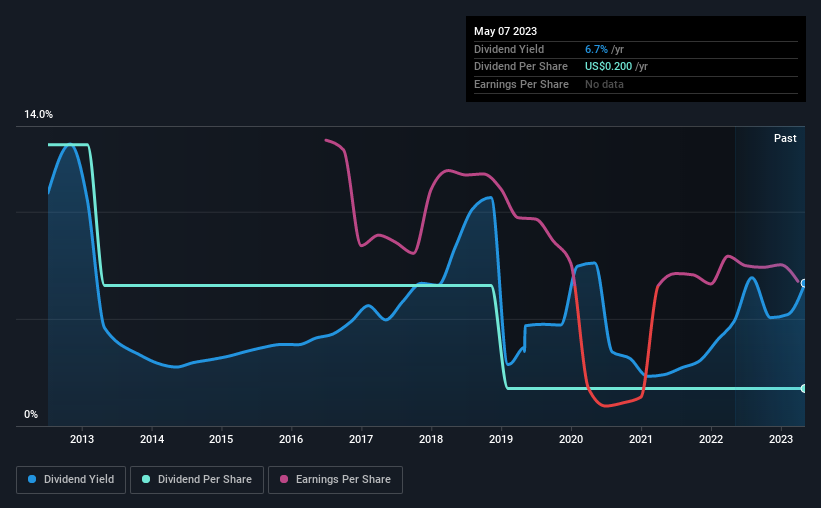
Pitney Bowes Inc. (NYSE:PBI) has announced that it will pay a dividend of $0.05 per share on the 8th of June. The dividend yield will be 6.7% based on this payment which is still above the industry average.
While the dividend yield is important for income investors, it is also important to consider any large share price moves, as this will generally outweigh any gains from distributions. Pitney Bowes' stock price has reduced by 32% in the last 3 months, which is not ideal for investors and can explain a sharp increase in the dividend yield.
View our latest analysis for Pitney Bowes
Pitney Bowes Is Paying Out More Than It Is Earning
A big dividend yield for a few years doesn't mean much if it can't be sustained. Before making this announcement, Pitney Bowes' dividend was higher than its profits, but the free cash flows quite comfortably covered it. Generally, we think cash is more important than accounting measures of profit, so with the cash flows easily covering the dividend, we don't think there is much reason to worry.
Earnings per share is forecast to rise by 93.9% over the next year. Assuming the dividend continues along recent trends, we think the payout ratio could reach 160%, which probably can't continue without putting some pressure on the balance sheet.

Dividend Volatility
The company has a long dividend track record, but it doesn't look great with cuts in the past. Since 2013, the dividend has gone from $1.50 total annually to $0.20. This works out to a decline of approximately 87% over that time. A company that decreases its dividend over time generally isn't what we are looking for.
The Dividend Has Limited Growth Potential
Given that the track record hasn't been stellar, we really want to see earnings per share growing over time. Pitney Bowes' earnings per share has shrunk at 47% a year over the past five years. Such rapid declines definitely have the potential to constrain dividend payments if the trend continues into the future. It's not all bad news though, as the earnings are predicted to rise over the next 12 months - we would just be a bit cautious until this becomes a long term trend.
Pitney Bowes' Dividend Doesn't Look Sustainable
In summary, while it's good to see that the dividend hasn't been cut, we are a bit cautious about Pitney Bowes' payments, as there could be some issues with sustaining them into the future. The company is generating plenty of cash, which could maintain the dividend for a while, but the track record hasn't been great. We don't think Pitney Bowes is a great stock to add to your portfolio if income is your focus.
Investors generally tend to favour companies with a consistent, stable dividend policy as opposed to those operating an irregular one. Meanwhile, despite the importance of dividend payments, they are not the only factors our readers should know when assessing a company. To that end, Pitney Bowes has 4 warning signs (and 1 which makes us a bit uncomfortable) we think you should know about. Is Pitney Bowes not quite the opportunity you were looking for? Why not check out our selection of top dividend stocks.
New: Manage All Your Stock Portfolios in One Place
We've created the ultimate portfolio companion for stock investors, and it's free.
• Connect an unlimited number of Portfolios and see your total in one currency
• Be alerted to new Warning Signs or Risks via email or mobile
• Track the Fair Value of your stocks
Have feedback on this article? Concerned about the content? Get in touch with us directly. Alternatively, email editorial-team (at) simplywallst.com.
This article by Simply Wall St is general in nature. We provide commentary based on historical data and analyst forecasts only using an unbiased methodology and our articles are not intended to be financial advice. It does not constitute a recommendation to buy or sell any stock, and does not take account of your objectives, or your financial situation. We aim to bring you long-term focused analysis driven by fundamental data. Note that our analysis may not factor in the latest price-sensitive company announcements or qualitative material. Simply Wall St has no position in any stocks mentioned.
About NYSE:PBI
Pitney Bowes
Operates as a technology-driven company that provides SaaS shipping solutions, mailing innovation, and financial services to small businesses, large enterprises, and government entities around the world.
Undervalued with moderate growth potential.
Similar Companies
Market Insights
Community Narratives



